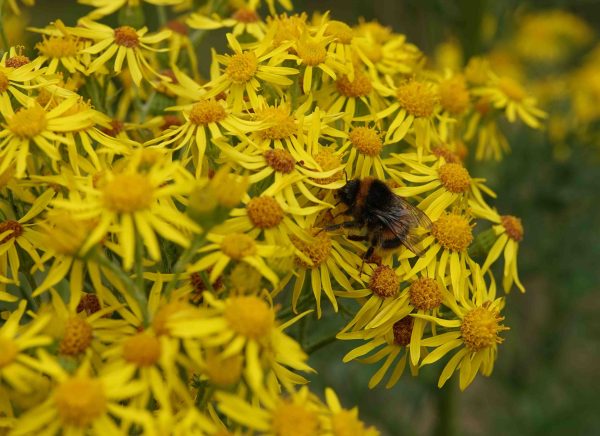
Image credit Emmeline Smith
Written by PhD student Emmeline Smith from SCENARIO DTP
For the 8th year running, farms around the world are facing the same devastating problem of global temperature change.
There has been mass media coverage of farmers battling disasters like floods and droughts. However, climate change is creating a much bigger risk to our food security that is receiving less attention from the media – the decline of insect pollinators such as wild bees.
Pollination is one of the most important ecosystem services in the world and is responsible for producing 70-90% of our crops globally (1). Without pollination our supermarket shelves would look completely different. Kitchen staples along with firm favourites such as apples, strawberries and even wine would be missing.
Wild bees are already suffering from the effects of climate risk both indirectly and directly in the U.K. Wild bees are susceptible to heat stress which can alter their behaviour and bodily functions. For example, high temperatures can reduce a male bee’s ability to reproduce by lowering their sperm count (2). Temperatures that exceed 40°C can be fatal to wild bees – a temperature that was first reached by the UK in the Summer of 2022 (2).
Heat stress can reduce the number of flowers, pollen and nectar a plant produces. This increases the area wild bees will need to forage for food and increases competition between the wild bee species. This issue is made worse as flowers would produce less seeds resulting in fewer flowering plants in the next season.
Not all flowering plants will suffer under climate change. Some may adapt and thrive. Yet this still isn’t good news as some wild bees feed on specific plants. Like humans most wild bees benefit from a balanced and varied diet. For example, carrots are nutritious but if we ate nothing but carrots for every meal, we would become malnourished and ill. Wild bees require a mixture of flowering plants with different nutritional values to stay healthy.
Globally pollination is worth around $235-577 billion, with£885 million directly benefiting the U.K’s economy (3, 4). Yet the very industry that gains the most from pollination services is actively contributing to its decline. Agriculture is responsible for 21-37% of total annual carbon emissions and the intensification of farming practices are to blame (5). Farmers have removed green features from fields, over-ploughed and left soil bare, all of which releases stored carbon into the atmosphere.
Field research into the decline of wild bees is not only costly but is also time consuming, time that we do not have under the pressures of climate change. I will use cutting edge agri-ecological modelling to create simulations of bee behaviour based on expert opinions. From this we can determine the most effective way to distribute green structures such as floral margins to boost wild bee populations as well as improve pollination services to farms. The outcome of these simulations can be applied to real world scenarios and assist in developing policy for pollinators.
COP27 brought agriculture to the forefront of climate discussions with the development of new positive action groups such as the AIM (Agriculture Innovation Mission for Climate), FAST (Food and Agriculture for Sustainable Transformation Initiative) and Global Fertilizer Challenge. However, conservation of pollination services needs to be directly addressed at COP28 to ensure future food security under climate risk.
Sources
(1) Safeguarding pollinators and their values to human well-being – ProQuest
(2) Response mechanisms to heat stress in bees | Apidologie (springer.com)
(3) Natural Resources Wales / Love pollinators

